Psychological Effects of Bullying in Middle School: A Report
VerifiedAdded on 2022/11/17
|12
|2865
|182
Report
AI Summary
This report delves into the pervasive issue of bullying and its profound psychological effects on middle school students. It explores the roles of victims, bullies, and observers, highlighting the detrimental impact on their mental health and well-being. The literature review synthesizes research on the causes and consequences of bullying, including anxiety, depression, and suicidal ideation. The report examines the specific psychological effects on victims, such as emotional withdrawal and academic decline, and the potential long-term consequences for bullies, including personality disorders. It also discusses the critical role of bystanders and the importance of intervention. Recommendations are provided for parents and teachers to support children in overcoming the effects of bullying and fostering a safer school environment. The report concludes by emphasizing the need for awareness and proactive measures to address this serious public health concern.
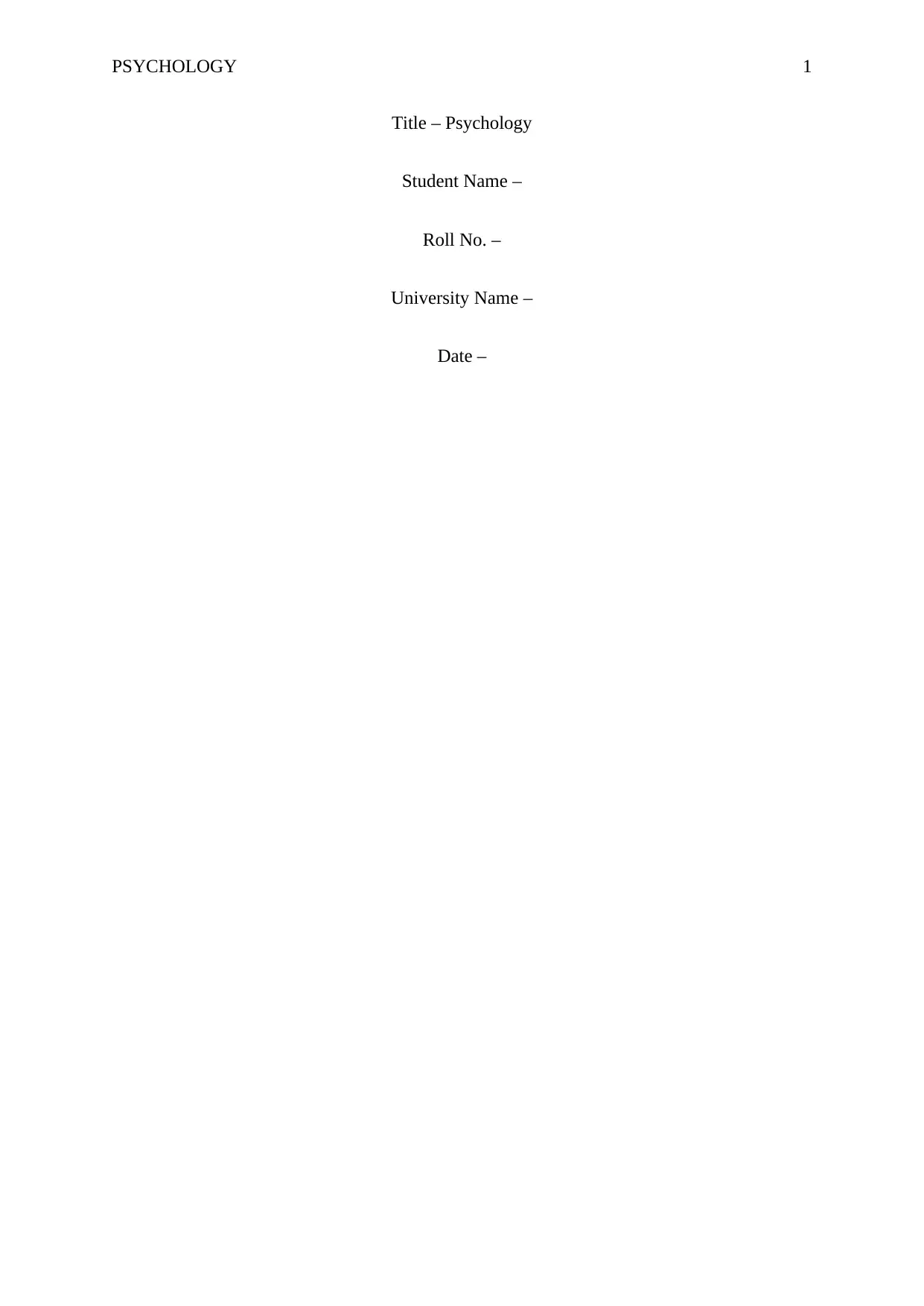
PSYCHOLOGY 1
Title – Psychology
Student Name –
Roll No. –
University Name –
Date –
Title – Psychology
Student Name –
Roll No. –
University Name –
Date –
Paraphrase This Document
Need a fresh take? Get an instant paraphrase of this document with our AI Paraphraser
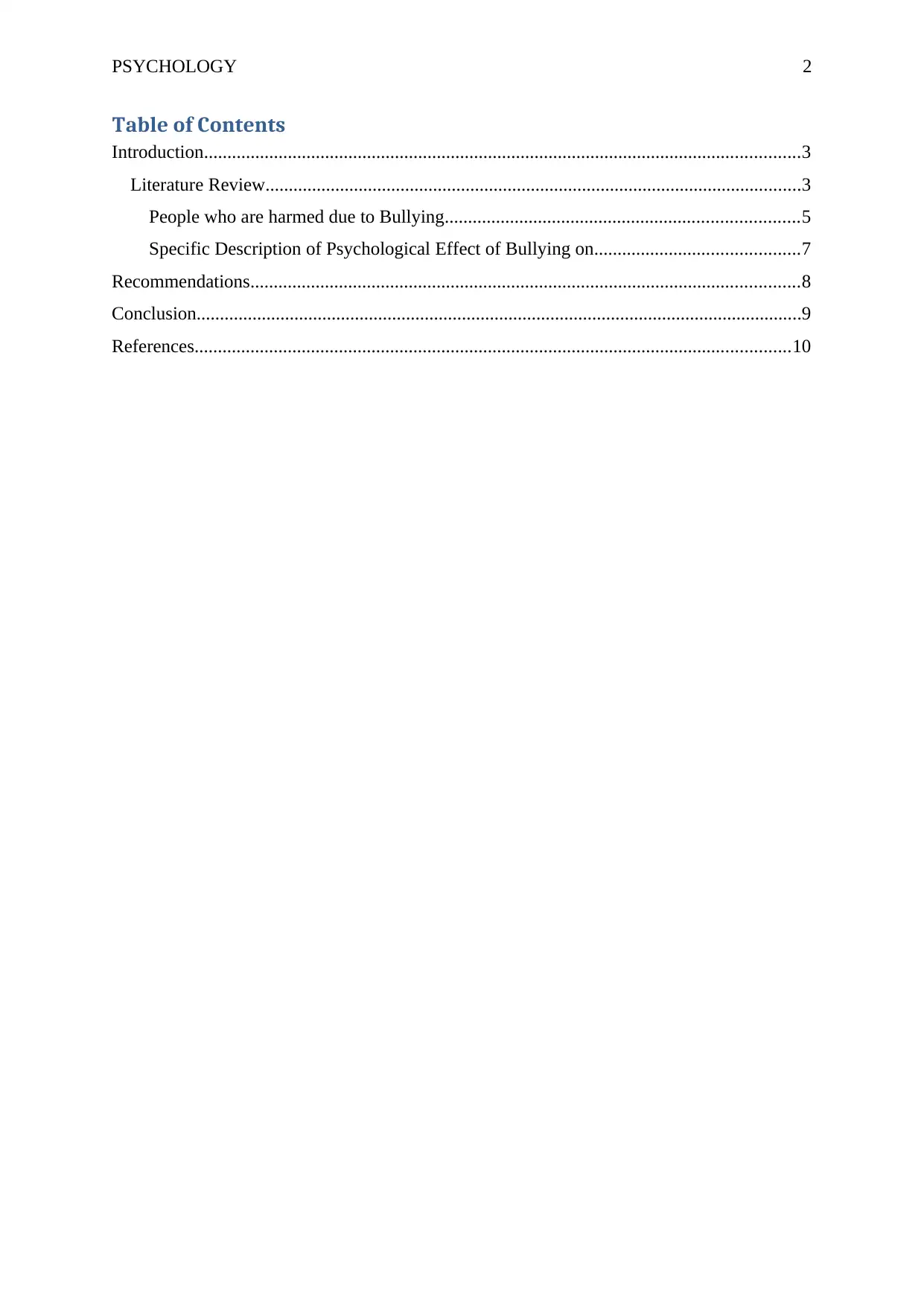
PSYCHOLOGY 2
Table of Contents
Introduction................................................................................................................................3
Literature Review...................................................................................................................3
People who are harmed due to Bullying............................................................................5
Specific Description of Psychological Effect of Bullying on............................................7
Recommendations......................................................................................................................8
Conclusion..................................................................................................................................9
References................................................................................................................................10
Table of Contents
Introduction................................................................................................................................3
Literature Review...................................................................................................................3
People who are harmed due to Bullying............................................................................5
Specific Description of Psychological Effect of Bullying on............................................7
Recommendations......................................................................................................................8
Conclusion..................................................................................................................................9
References................................................................................................................................10
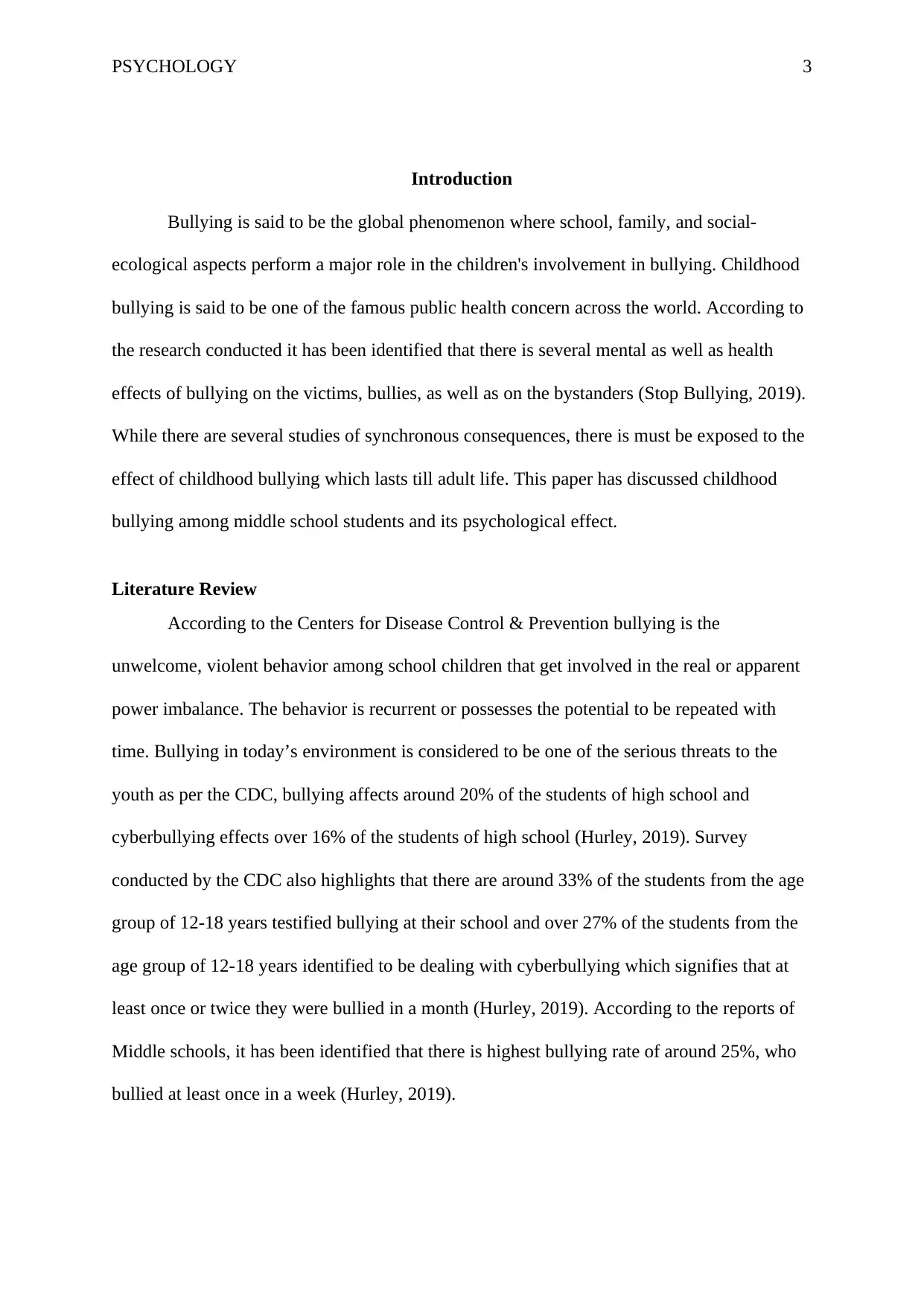
PSYCHOLOGY 3
Introduction
Bullying is said to be the global phenomenon where school, family, and social-
ecological aspects perform a major role in the children's involvement in bullying. Childhood
bullying is said to be one of the famous public health concern across the world. According to
the research conducted it has been identified that there is several mental as well as health
effects of bullying on the victims, bullies, as well as on the bystanders (Stop Bullying, 2019).
While there are several studies of synchronous consequences, there is must be exposed to the
effect of childhood bullying which lasts till adult life. This paper has discussed childhood
bullying among middle school students and its psychological effect.
Literature Review
According to the Centers for Disease Control & Prevention bullying is the
unwelcome, violent behavior among school children that get involved in the real or apparent
power imbalance. The behavior is recurrent or possesses the potential to be repeated with
time. Bullying in today’s environment is considered to be one of the serious threats to the
youth as per the CDC, bullying affects around 20% of the students of high school and
cyberbullying effects over 16% of the students of high school (Hurley, 2019). Survey
conducted by the CDC also highlights that there are around 33% of the students from the age
group of 12-18 years testified bullying at their school and over 27% of the students from the
age group of 12-18 years identified to be dealing with cyberbullying which signifies that at
least once or twice they were bullied in a month (Hurley, 2019). According to the reports of
Middle schools, it has been identified that there is highest bullying rate of around 25%, who
bullied at least once in a week (Hurley, 2019).
Introduction
Bullying is said to be the global phenomenon where school, family, and social-
ecological aspects perform a major role in the children's involvement in bullying. Childhood
bullying is said to be one of the famous public health concern across the world. According to
the research conducted it has been identified that there is several mental as well as health
effects of bullying on the victims, bullies, as well as on the bystanders (Stop Bullying, 2019).
While there are several studies of synchronous consequences, there is must be exposed to the
effect of childhood bullying which lasts till adult life. This paper has discussed childhood
bullying among middle school students and its psychological effect.
Literature Review
According to the Centers for Disease Control & Prevention bullying is the
unwelcome, violent behavior among school children that get involved in the real or apparent
power imbalance. The behavior is recurrent or possesses the potential to be repeated with
time. Bullying in today’s environment is considered to be one of the serious threats to the
youth as per the CDC, bullying affects around 20% of the students of high school and
cyberbullying effects over 16% of the students of high school (Hurley, 2019). Survey
conducted by the CDC also highlights that there are around 33% of the students from the age
group of 12-18 years testified bullying at their school and over 27% of the students from the
age group of 12-18 years identified to be dealing with cyberbullying which signifies that at
least once or twice they were bullied in a month (Hurley, 2019). According to the reports of
Middle schools, it has been identified that there is highest bullying rate of around 25%, who
bullied at least once in a week (Hurley, 2019).
⊘ This is a preview!⊘
Do you want full access?
Subscribe today to unlock all pages.

Trusted by 1+ million students worldwide
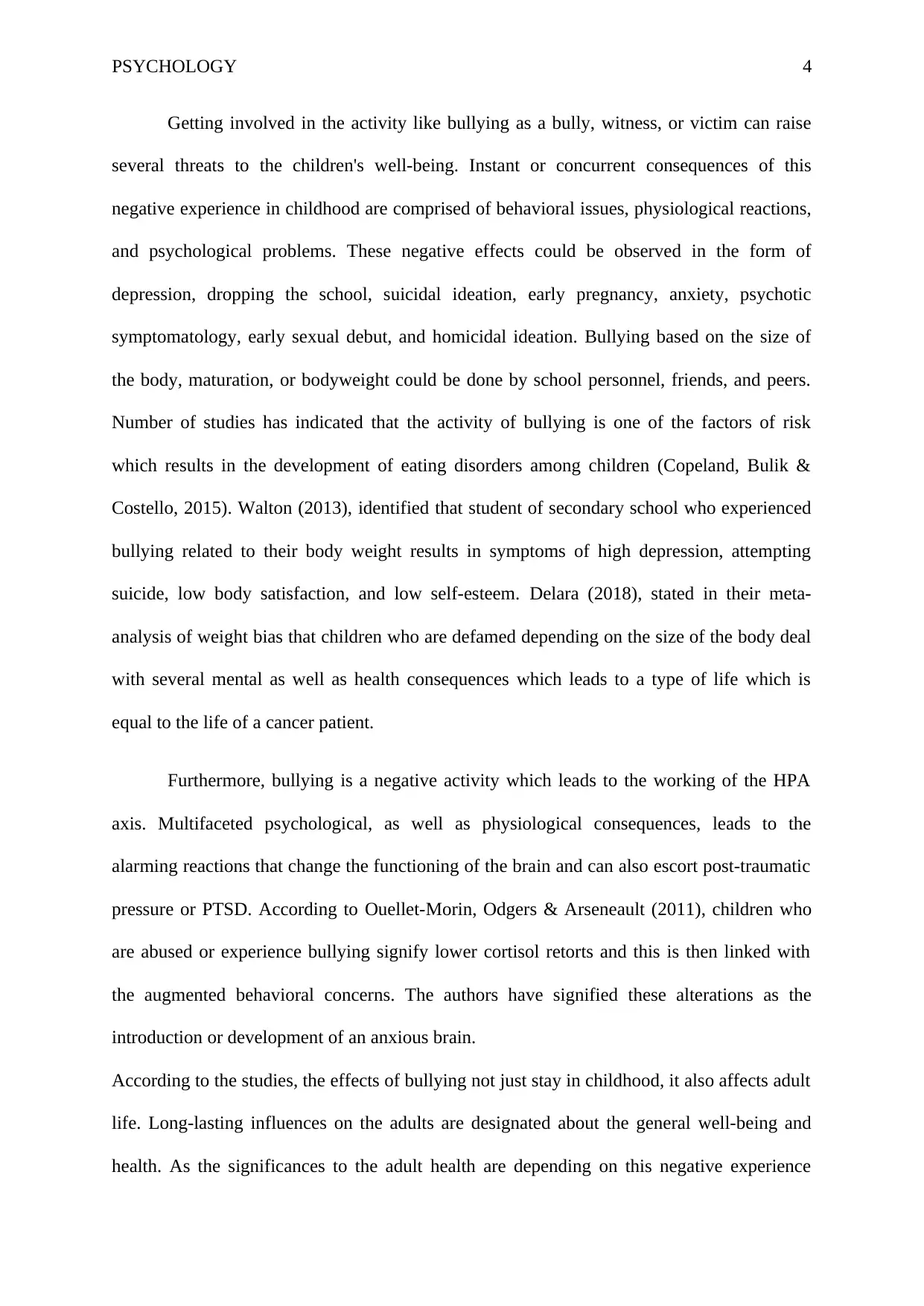
PSYCHOLOGY 4
Getting involved in the activity like bullying as a bully, witness, or victim can raise
several threats to the children's well-being. Instant or concurrent consequences of this
negative experience in childhood are comprised of behavioral issues, physiological reactions,
and psychological problems. These negative effects could be observed in the form of
depression, dropping the school, suicidal ideation, early pregnancy, anxiety, psychotic
symptomatology, early sexual debut, and homicidal ideation. Bullying based on the size of
the body, maturation, or bodyweight could be done by school personnel, friends, and peers.
Number of studies has indicated that the activity of bullying is one of the factors of risk
which results in the development of eating disorders among children (Copeland, Bulik &
Costello, 2015). Walton (2013), identified that student of secondary school who experienced
bullying related to their body weight results in symptoms of high depression, attempting
suicide, low body satisfaction, and low self-esteem. Delara (2018), stated in their meta-
analysis of weight bias that children who are defamed depending on the size of the body deal
with several mental as well as health consequences which leads to a type of life which is
equal to the life of a cancer patient.
Furthermore, bullying is a negative activity which leads to the working of the HPA
axis. Multifaceted psychological, as well as physiological consequences, leads to the
alarming reactions that change the functioning of the brain and can also escort post-traumatic
pressure or PTSD. According to Ouellet-Morin, Odgers & Arseneault (2011), children who
are abused or experience bullying signify lower cortisol retorts and this is then linked with
the augmented behavioral concerns. The authors have signified these alterations as the
introduction or development of an anxious brain.
According to the studies, the effects of bullying not just stay in childhood, it also affects adult
life. Long-lasting influences on the adults are designated about the general well-being and
health. As the significances to the adult health are depending on this negative experience
Getting involved in the activity like bullying as a bully, witness, or victim can raise
several threats to the children's well-being. Instant or concurrent consequences of this
negative experience in childhood are comprised of behavioral issues, physiological reactions,
and psychological problems. These negative effects could be observed in the form of
depression, dropping the school, suicidal ideation, early pregnancy, anxiety, psychotic
symptomatology, early sexual debut, and homicidal ideation. Bullying based on the size of
the body, maturation, or bodyweight could be done by school personnel, friends, and peers.
Number of studies has indicated that the activity of bullying is one of the factors of risk
which results in the development of eating disorders among children (Copeland, Bulik &
Costello, 2015). Walton (2013), identified that student of secondary school who experienced
bullying related to their body weight results in symptoms of high depression, attempting
suicide, low body satisfaction, and low self-esteem. Delara (2018), stated in their meta-
analysis of weight bias that children who are defamed depending on the size of the body deal
with several mental as well as health consequences which leads to a type of life which is
equal to the life of a cancer patient.
Furthermore, bullying is a negative activity which leads to the working of the HPA
axis. Multifaceted psychological, as well as physiological consequences, leads to the
alarming reactions that change the functioning of the brain and can also escort post-traumatic
pressure or PTSD. According to Ouellet-Morin, Odgers & Arseneault (2011), children who
are abused or experience bullying signify lower cortisol retorts and this is then linked with
the augmented behavioral concerns. The authors have signified these alterations as the
introduction or development of an anxious brain.
According to the studies, the effects of bullying not just stay in childhood, it also affects adult
life. Long-lasting influences on the adults are designated about the general well-being and
health. As the significances to the adult health are depending on this negative experience
Paraphrase This Document
Need a fresh take? Get an instant paraphrase of this document with our AI Paraphraser
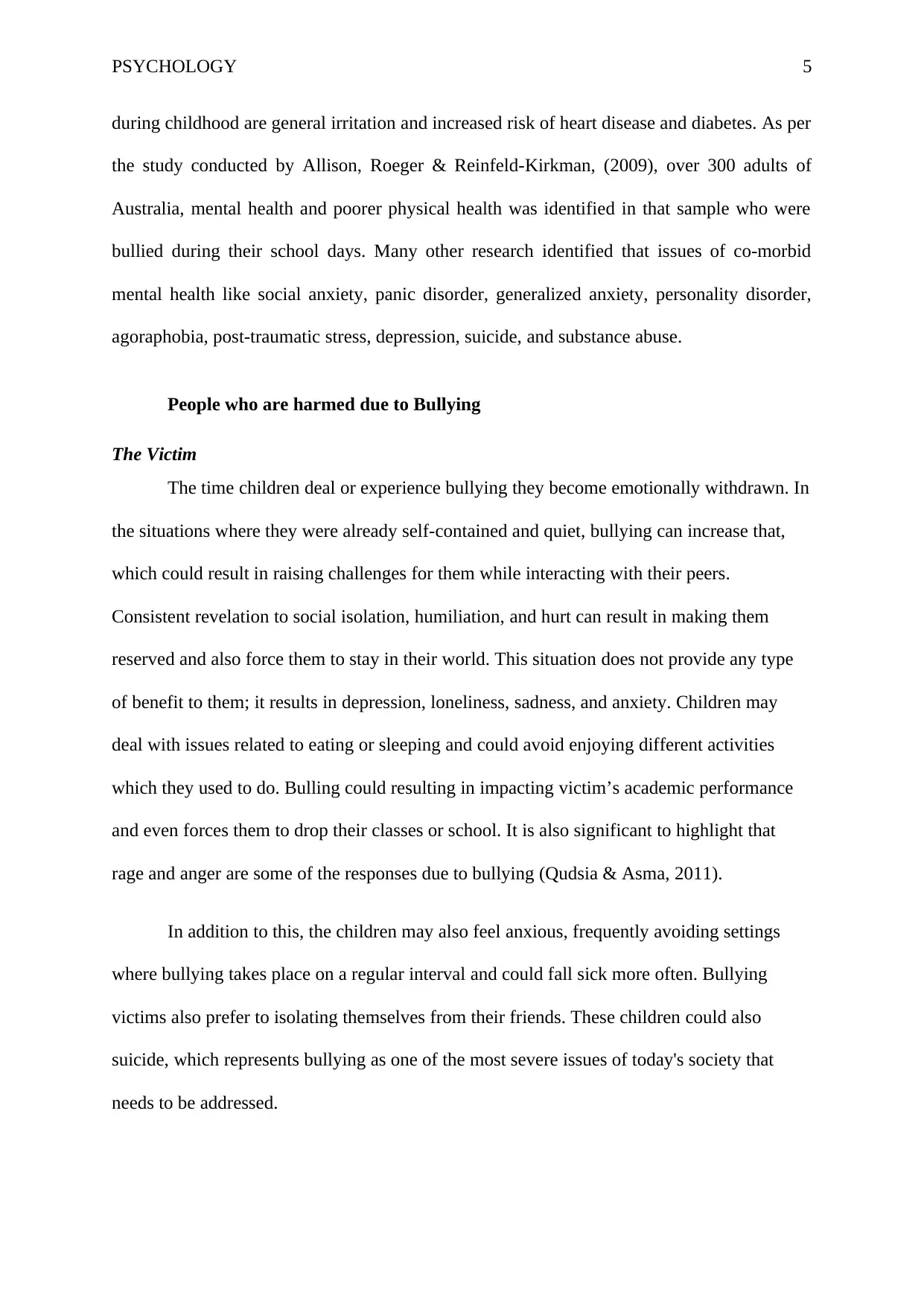
PSYCHOLOGY 5
during childhood are general irritation and increased risk of heart disease and diabetes. As per
the study conducted by Allison, Roeger & Reinfeld-Kirkman, (2009), over 300 adults of
Australia, mental health and poorer physical health was identified in that sample who were
bullied during their school days. Many other research identified that issues of co-morbid
mental health like social anxiety, panic disorder, generalized anxiety, personality disorder,
agoraphobia, post-traumatic stress, depression, suicide, and substance abuse.
People who are harmed due to Bullying
The Victim
The time children deal or experience bullying they become emotionally withdrawn. In
the situations where they were already self-contained and quiet, bullying can increase that,
which could result in raising challenges for them while interacting with their peers.
Consistent revelation to social isolation, humiliation, and hurt can result in making them
reserved and also force them to stay in their world. This situation does not provide any type
of benefit to them; it results in depression, loneliness, sadness, and anxiety. Children may
deal with issues related to eating or sleeping and could avoid enjoying different activities
which they used to do. Bulling could resulting in impacting victim’s academic performance
and even forces them to drop their classes or school. It is also significant to highlight that
rage and anger are some of the responses due to bullying (Qudsia & Asma, 2011).
In addition to this, the children may also feel anxious, frequently avoiding settings
where bullying takes place on a regular interval and could fall sick more often. Bullying
victims also prefer to isolating themselves from their friends. These children could also
suicide, which represents bullying as one of the most severe issues of today's society that
needs to be addressed.
during childhood are general irritation and increased risk of heart disease and diabetes. As per
the study conducted by Allison, Roeger & Reinfeld-Kirkman, (2009), over 300 adults of
Australia, mental health and poorer physical health was identified in that sample who were
bullied during their school days. Many other research identified that issues of co-morbid
mental health like social anxiety, panic disorder, generalized anxiety, personality disorder,
agoraphobia, post-traumatic stress, depression, suicide, and substance abuse.
People who are harmed due to Bullying
The Victim
The time children deal or experience bullying they become emotionally withdrawn. In
the situations where they were already self-contained and quiet, bullying can increase that,
which could result in raising challenges for them while interacting with their peers.
Consistent revelation to social isolation, humiliation, and hurt can result in making them
reserved and also force them to stay in their world. This situation does not provide any type
of benefit to them; it results in depression, loneliness, sadness, and anxiety. Children may
deal with issues related to eating or sleeping and could avoid enjoying different activities
which they used to do. Bulling could resulting in impacting victim’s academic performance
and even forces them to drop their classes or school. It is also significant to highlight that
rage and anger are some of the responses due to bullying (Qudsia & Asma, 2011).
In addition to this, the children may also feel anxious, frequently avoiding settings
where bullying takes place on a regular interval and could fall sick more often. Bullying
victims also prefer to isolating themselves from their friends. These children could also
suicide, which represents bullying as one of the most severe issues of today's society that
needs to be addressed.
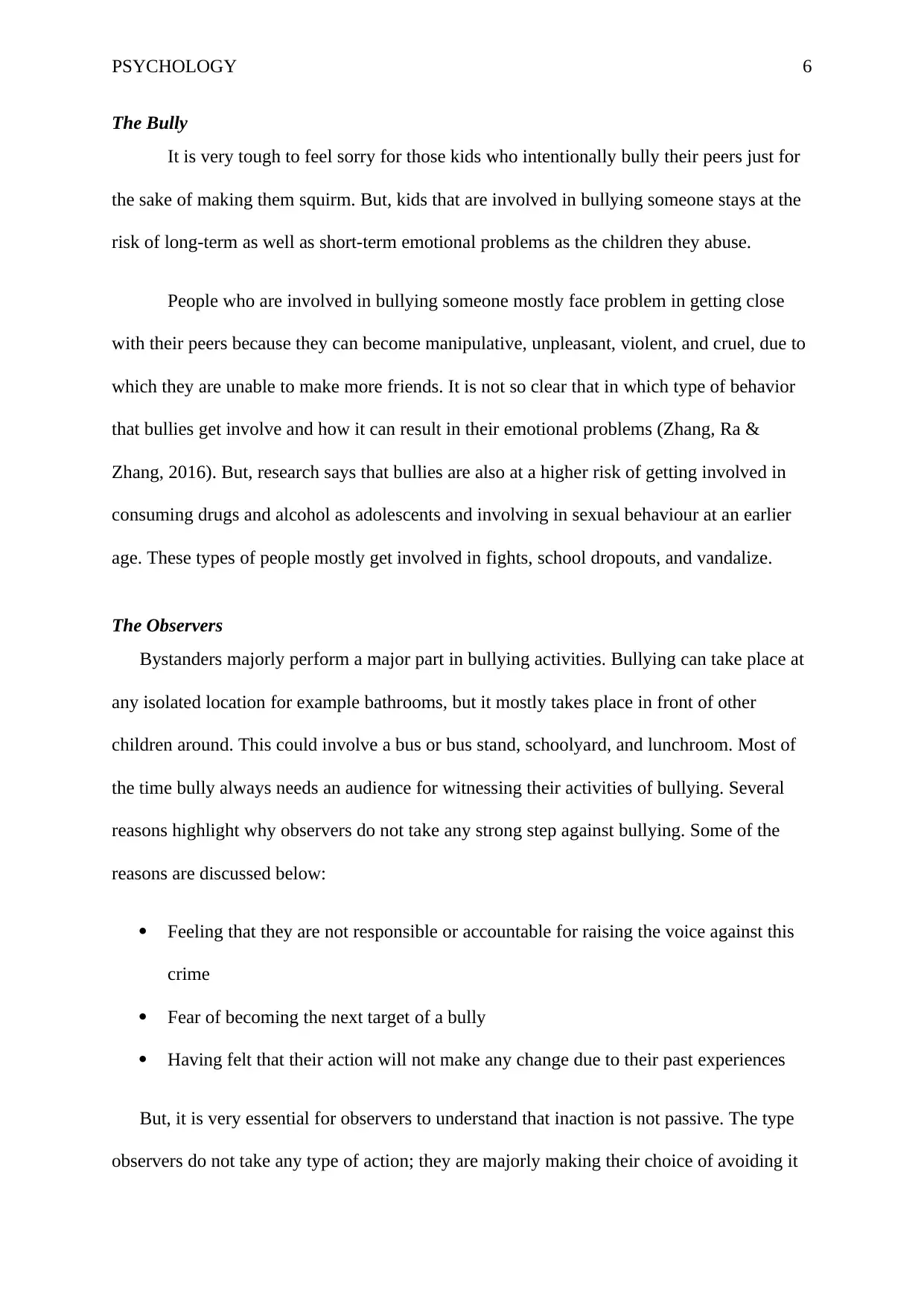
PSYCHOLOGY 6
The Bully
It is very tough to feel sorry for those kids who intentionally bully their peers just for
the sake of making them squirm. But, kids that are involved in bullying someone stays at the
risk of long-term as well as short-term emotional problems as the children they abuse.
People who are involved in bullying someone mostly face problem in getting close
with their peers because they can become manipulative, unpleasant, violent, and cruel, due to
which they are unable to make more friends. It is not so clear that in which type of behavior
that bullies get involve and how it can result in their emotional problems (Zhang, Ra &
Zhang, 2016). But, research says that bullies are also at a higher risk of getting involved in
consuming drugs and alcohol as adolescents and involving in sexual behaviour at an earlier
age. These types of people mostly get involved in fights, school dropouts, and vandalize.
The Observers
Bystanders majorly perform a major part in bullying activities. Bullying can take place at
any isolated location for example bathrooms, but it mostly takes place in front of other
children around. This could involve a bus or bus stand, schoolyard, and lunchroom. Most of
the time bully always needs an audience for witnessing their activities of bullying. Several
reasons highlight why observers do not take any strong step against bullying. Some of the
reasons are discussed below:
Feeling that they are not responsible or accountable for raising the voice against this
crime
Fear of becoming the next target of a bully
Having felt that their action will not make any change due to their past experiences
But, it is very essential for observers to understand that inaction is not passive. The type
observers do not take any type of action; they are majorly making their choice of avoiding it
The Bully
It is very tough to feel sorry for those kids who intentionally bully their peers just for
the sake of making them squirm. But, kids that are involved in bullying someone stays at the
risk of long-term as well as short-term emotional problems as the children they abuse.
People who are involved in bullying someone mostly face problem in getting close
with their peers because they can become manipulative, unpleasant, violent, and cruel, due to
which they are unable to make more friends. It is not so clear that in which type of behavior
that bullies get involve and how it can result in their emotional problems (Zhang, Ra &
Zhang, 2016). But, research says that bullies are also at a higher risk of getting involved in
consuming drugs and alcohol as adolescents and involving in sexual behaviour at an earlier
age. These types of people mostly get involved in fights, school dropouts, and vandalize.
The Observers
Bystanders majorly perform a major part in bullying activities. Bullying can take place at
any isolated location for example bathrooms, but it mostly takes place in front of other
children around. This could involve a bus or bus stand, schoolyard, and lunchroom. Most of
the time bully always needs an audience for witnessing their activities of bullying. Several
reasons highlight why observers do not take any strong step against bullying. Some of the
reasons are discussed below:
Feeling that they are not responsible or accountable for raising the voice against this
crime
Fear of becoming the next target of a bully
Having felt that their action will not make any change due to their past experiences
But, it is very essential for observers to understand that inaction is not passive. The type
observers do not take any type of action; they are majorly making their choice of avoiding it
⊘ This is a preview!⊘
Do you want full access?
Subscribe today to unlock all pages.

Trusted by 1+ million students worldwide
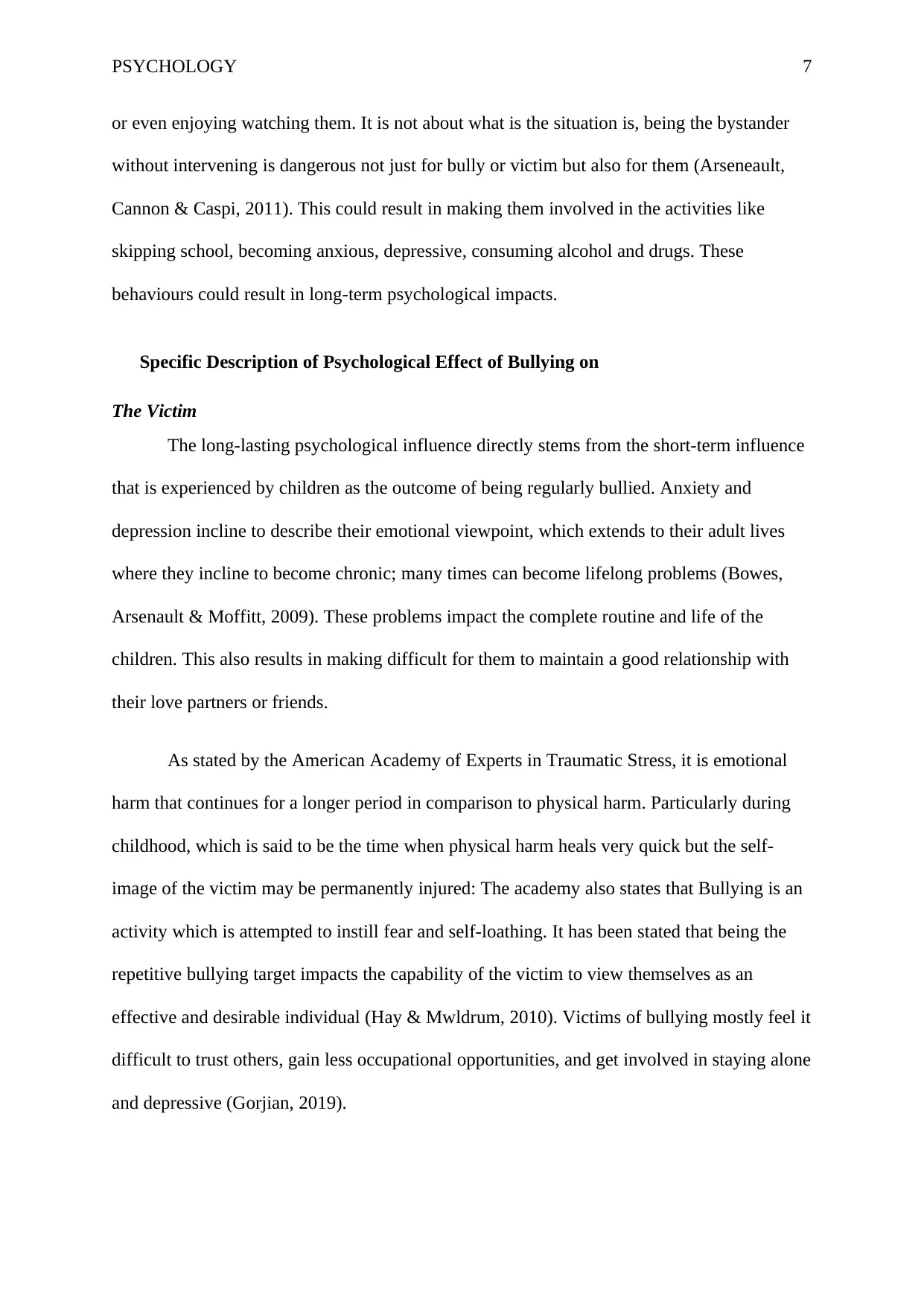
PSYCHOLOGY 7
or even enjoying watching them. It is not about what is the situation is, being the bystander
without intervening is dangerous not just for bully or victim but also for them (Arseneault,
Cannon & Caspi, 2011). This could result in making them involved in the activities like
skipping school, becoming anxious, depressive, consuming alcohol and drugs. These
behaviours could result in long-term psychological impacts.
Specific Description of Psychological Effect of Bullying on
The Victim
The long-lasting psychological influence directly stems from the short-term influence
that is experienced by children as the outcome of being regularly bullied. Anxiety and
depression incline to describe their emotional viewpoint, which extends to their adult lives
where they incline to become chronic; many times can become lifelong problems (Bowes,
Arsenault & Moffitt, 2009). These problems impact the complete routine and life of the
children. This also results in making difficult for them to maintain a good relationship with
their love partners or friends.
As stated by the American Academy of Experts in Traumatic Stress, it is emotional
harm that continues for a longer period in comparison to physical harm. Particularly during
childhood, which is said to be the time when physical harm heals very quick but the self-
image of the victim may be permanently injured: The academy also states that Bullying is an
activity which is attempted to instill fear and self-loathing. It has been stated that being the
repetitive bullying target impacts the capability of the victim to view themselves as an
effective and desirable individual (Hay & Mwldrum, 2010). Victims of bullying mostly feel it
difficult to trust others, gain less occupational opportunities, and get involved in staying alone
and depressive (Gorjian, 2019).
or even enjoying watching them. It is not about what is the situation is, being the bystander
without intervening is dangerous not just for bully or victim but also for them (Arseneault,
Cannon & Caspi, 2011). This could result in making them involved in the activities like
skipping school, becoming anxious, depressive, consuming alcohol and drugs. These
behaviours could result in long-term psychological impacts.
Specific Description of Psychological Effect of Bullying on
The Victim
The long-lasting psychological influence directly stems from the short-term influence
that is experienced by children as the outcome of being regularly bullied. Anxiety and
depression incline to describe their emotional viewpoint, which extends to their adult lives
where they incline to become chronic; many times can become lifelong problems (Bowes,
Arsenault & Moffitt, 2009). These problems impact the complete routine and life of the
children. This also results in making difficult for them to maintain a good relationship with
their love partners or friends.
As stated by the American Academy of Experts in Traumatic Stress, it is emotional
harm that continues for a longer period in comparison to physical harm. Particularly during
childhood, which is said to be the time when physical harm heals very quick but the self-
image of the victim may be permanently injured: The academy also states that Bullying is an
activity which is attempted to instill fear and self-loathing. It has been stated that being the
repetitive bullying target impacts the capability of the victim to view themselves as an
effective and desirable individual (Hay & Mwldrum, 2010). Victims of bullying mostly feel it
difficult to trust others, gain less occupational opportunities, and get involved in staying alone
and depressive (Gorjian, 2019).
Paraphrase This Document
Need a fresh take? Get an instant paraphrase of this document with our AI Paraphraser
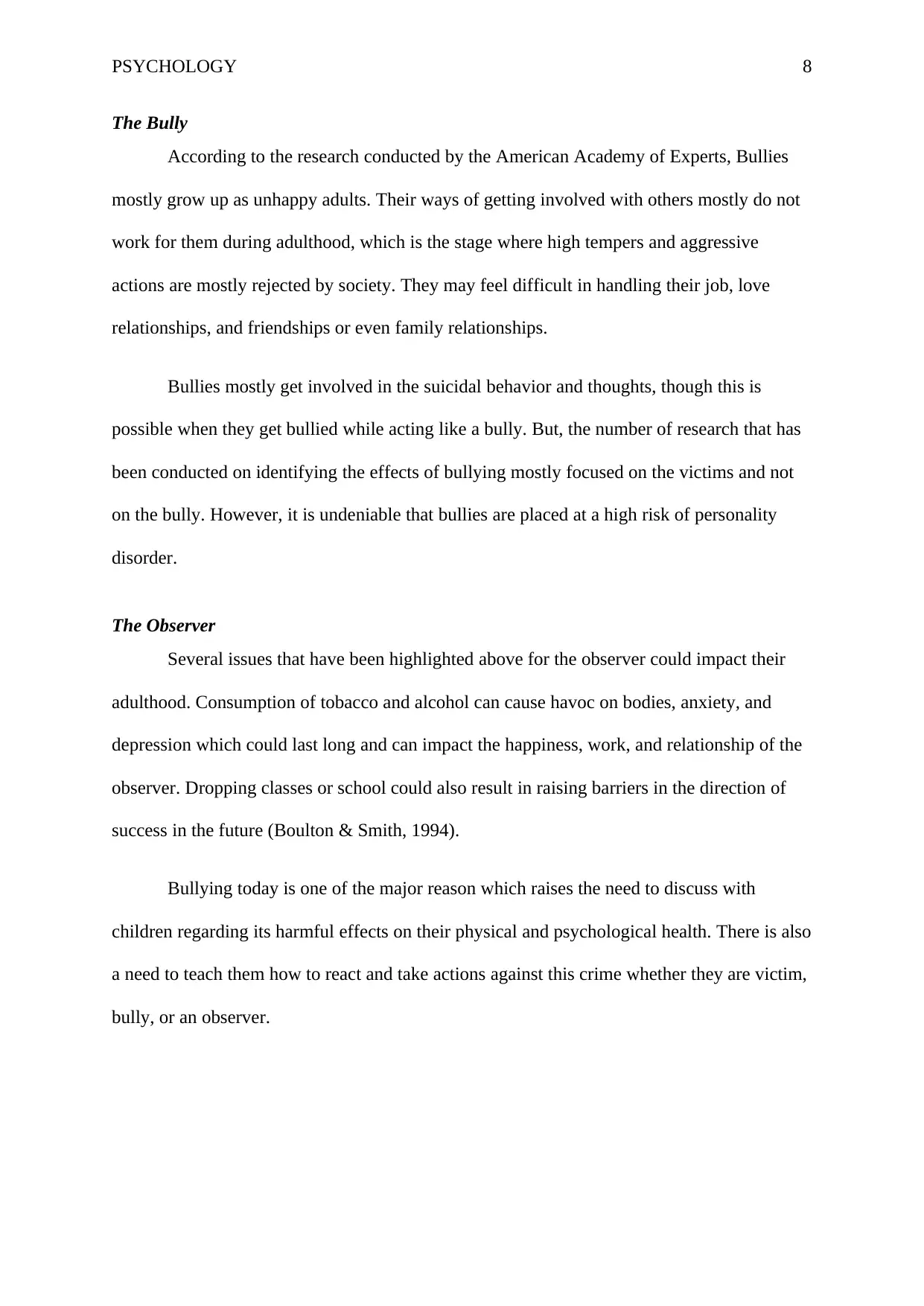
PSYCHOLOGY 8
The Bully
According to the research conducted by the American Academy of Experts, Bullies
mostly grow up as unhappy adults. Their ways of getting involved with others mostly do not
work for them during adulthood, which is the stage where high tempers and aggressive
actions are mostly rejected by society. They may feel difficult in handling their job, love
relationships, and friendships or even family relationships.
Bullies mostly get involved in the suicidal behavior and thoughts, though this is
possible when they get bullied while acting like a bully. But, the number of research that has
been conducted on identifying the effects of bullying mostly focused on the victims and not
on the bully. However, it is undeniable that bullies are placed at a high risk of personality
disorder.
The Observer
Several issues that have been highlighted above for the observer could impact their
adulthood. Consumption of tobacco and alcohol can cause havoc on bodies, anxiety, and
depression which could last long and can impact the happiness, work, and relationship of the
observer. Dropping classes or school could also result in raising barriers in the direction of
success in the future (Boulton & Smith, 1994).
Bullying today is one of the major reason which raises the need to discuss with
children regarding its harmful effects on their physical and psychological health. There is also
a need to teach them how to react and take actions against this crime whether they are victim,
bully, or an observer.
The Bully
According to the research conducted by the American Academy of Experts, Bullies
mostly grow up as unhappy adults. Their ways of getting involved with others mostly do not
work for them during adulthood, which is the stage where high tempers and aggressive
actions are mostly rejected by society. They may feel difficult in handling their job, love
relationships, and friendships or even family relationships.
Bullies mostly get involved in the suicidal behavior and thoughts, though this is
possible when they get bullied while acting like a bully. But, the number of research that has
been conducted on identifying the effects of bullying mostly focused on the victims and not
on the bully. However, it is undeniable that bullies are placed at a high risk of personality
disorder.
The Observer
Several issues that have been highlighted above for the observer could impact their
adulthood. Consumption of tobacco and alcohol can cause havoc on bodies, anxiety, and
depression which could last long and can impact the happiness, work, and relationship of the
observer. Dropping classes or school could also result in raising barriers in the direction of
success in the future (Boulton & Smith, 1994).
Bullying today is one of the major reason which raises the need to discuss with
children regarding its harmful effects on their physical and psychological health. There is also
a need to teach them how to react and take actions against this crime whether they are victim,
bully, or an observer.
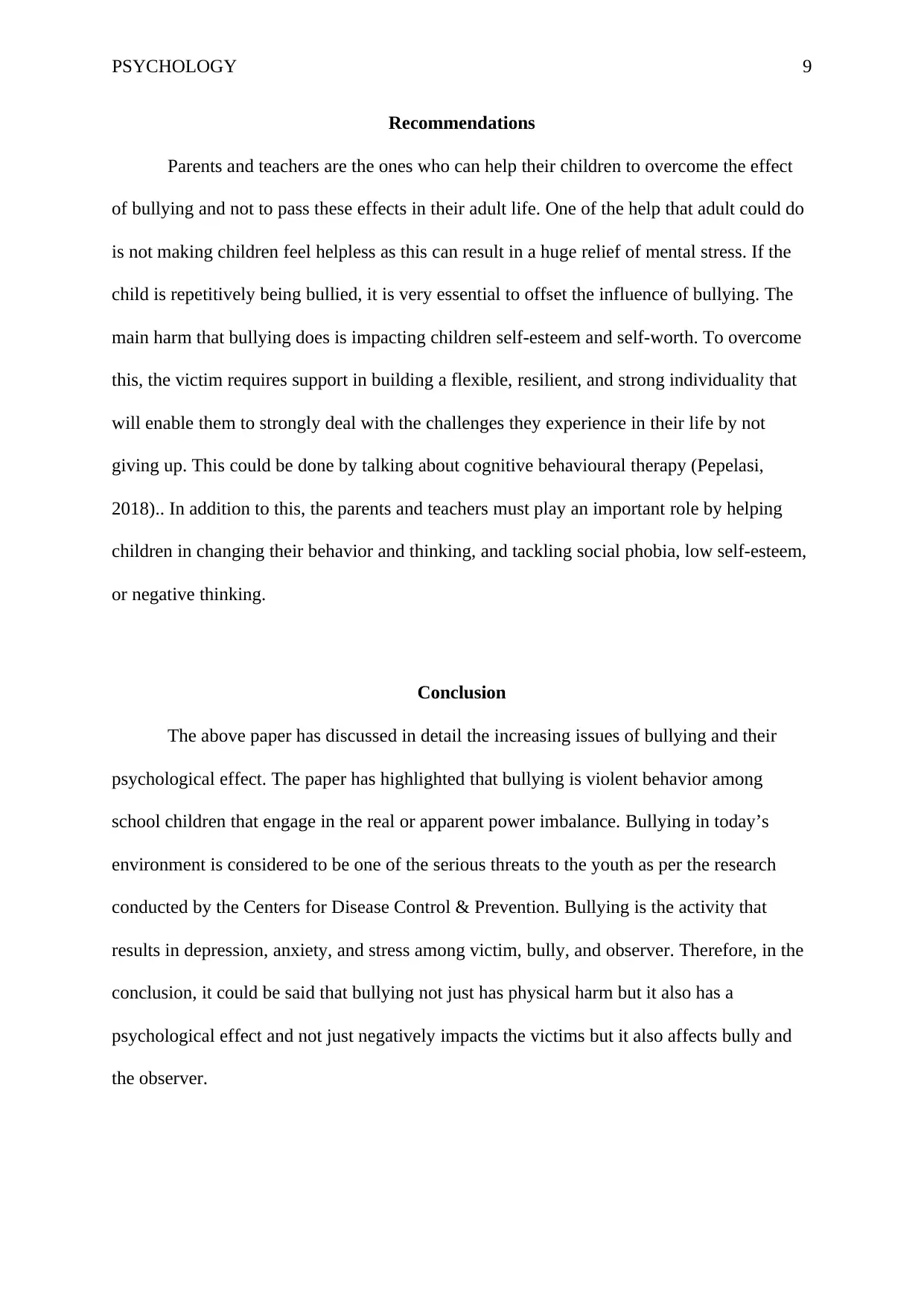
PSYCHOLOGY 9
Recommendations
Parents and teachers are the ones who can help their children to overcome the effect
of bullying and not to pass these effects in their adult life. One of the help that adult could do
is not making children feel helpless as this can result in a huge relief of mental stress. If the
child is repetitively being bullied, it is very essential to offset the influence of bullying. The
main harm that bullying does is impacting children self-esteem and self-worth. To overcome
this, the victim requires support in building a flexible, resilient, and strong individuality that
will enable them to strongly deal with the challenges they experience in their life by not
giving up. This could be done by talking about cognitive behavioural therapy (Pepelasi,
2018).. In addition to this, the parents and teachers must play an important role by helping
children in changing their behavior and thinking, and tackling social phobia, low self-esteem,
or negative thinking.
Conclusion
The above paper has discussed in detail the increasing issues of bullying and their
psychological effect. The paper has highlighted that bullying is violent behavior among
school children that engage in the real or apparent power imbalance. Bullying in today’s
environment is considered to be one of the serious threats to the youth as per the research
conducted by the Centers for Disease Control & Prevention. Bullying is the activity that
results in depression, anxiety, and stress among victim, bully, and observer. Therefore, in the
conclusion, it could be said that bullying not just has physical harm but it also has a
psychological effect and not just negatively impacts the victims but it also affects bully and
the observer.
Recommendations
Parents and teachers are the ones who can help their children to overcome the effect
of bullying and not to pass these effects in their adult life. One of the help that adult could do
is not making children feel helpless as this can result in a huge relief of mental stress. If the
child is repetitively being bullied, it is very essential to offset the influence of bullying. The
main harm that bullying does is impacting children self-esteem and self-worth. To overcome
this, the victim requires support in building a flexible, resilient, and strong individuality that
will enable them to strongly deal with the challenges they experience in their life by not
giving up. This could be done by talking about cognitive behavioural therapy (Pepelasi,
2018).. In addition to this, the parents and teachers must play an important role by helping
children in changing their behavior and thinking, and tackling social phobia, low self-esteem,
or negative thinking.
Conclusion
The above paper has discussed in detail the increasing issues of bullying and their
psychological effect. The paper has highlighted that bullying is violent behavior among
school children that engage in the real or apparent power imbalance. Bullying in today’s
environment is considered to be one of the serious threats to the youth as per the research
conducted by the Centers for Disease Control & Prevention. Bullying is the activity that
results in depression, anxiety, and stress among victim, bully, and observer. Therefore, in the
conclusion, it could be said that bullying not just has physical harm but it also has a
psychological effect and not just negatively impacts the victims but it also affects bully and
the observer.
⊘ This is a preview!⊘
Do you want full access?
Subscribe today to unlock all pages.

Trusted by 1+ million students worldwide
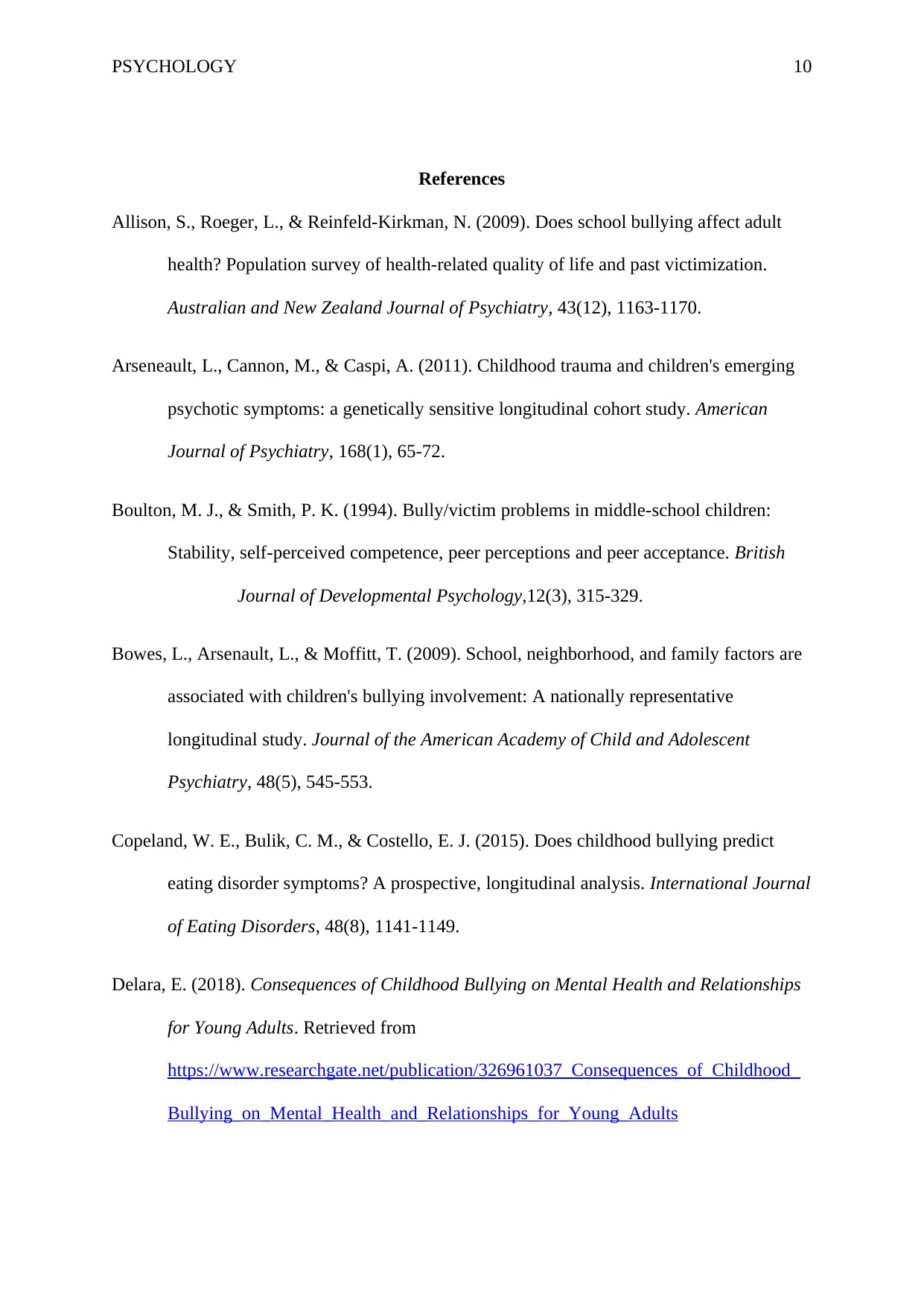
PSYCHOLOGY 10
References
Allison, S., Roeger, L., & Reinfeld-Kirkman, N. (2009). Does school bullying affect adult
health? Population survey of health-related quality of life and past victimization.
Australian and New Zealand Journal of Psychiatry, 43(12), 1163-1170.
Arseneault, L., Cannon, M., & Caspi, A. (2011). Childhood trauma and children's emerging
psychotic symptoms: a genetically sensitive longitudinal cohort study. American
Journal of Psychiatry, 168(1), 65-72.
Boulton, M. J., & Smith, P. K. (1994). Bully/victim problems in middle-school children:
Stability, self-perceived competence, peer perceptions and peer acceptance. British
Journal of Developmental Psychology,12(3), 315-329.
Bowes, L., Arsenault, L., & Moffitt, T. (2009). School, neighborhood, and family factors are
associated with children's bullying involvement: A nationally representative
longitudinal study. Journal of the American Academy of Child and Adolescent
Psychiatry, 48(5), 545-553.
Copeland, W. E., Bulik, C. M., & Costello, E. J. (2015). Does childhood bullying predict
eating disorder symptoms? A prospective, longitudinal analysis. International Journal
of Eating Disorders, 48(8), 1141-1149.
Delara, E. (2018). Consequences of Childhood Bullying on Mental Health and Relationships
for Young Adults. Retrieved from
https://www.researchgate.net/publication/326961037_Consequences_of_Childhood_
Bullying_on_Mental_Health_and_Relationships_for_Young_Adults
References
Allison, S., Roeger, L., & Reinfeld-Kirkman, N. (2009). Does school bullying affect adult
health? Population survey of health-related quality of life and past victimization.
Australian and New Zealand Journal of Psychiatry, 43(12), 1163-1170.
Arseneault, L., Cannon, M., & Caspi, A. (2011). Childhood trauma and children's emerging
psychotic symptoms: a genetically sensitive longitudinal cohort study. American
Journal of Psychiatry, 168(1), 65-72.
Boulton, M. J., & Smith, P. K. (1994). Bully/victim problems in middle-school children:
Stability, self-perceived competence, peer perceptions and peer acceptance. British
Journal of Developmental Psychology,12(3), 315-329.
Bowes, L., Arsenault, L., & Moffitt, T. (2009). School, neighborhood, and family factors are
associated with children's bullying involvement: A nationally representative
longitudinal study. Journal of the American Academy of Child and Adolescent
Psychiatry, 48(5), 545-553.
Copeland, W. E., Bulik, C. M., & Costello, E. J. (2015). Does childhood bullying predict
eating disorder symptoms? A prospective, longitudinal analysis. International Journal
of Eating Disorders, 48(8), 1141-1149.
Delara, E. (2018). Consequences of Childhood Bullying on Mental Health and Relationships
for Young Adults. Retrieved from
https://www.researchgate.net/publication/326961037_Consequences_of_Childhood_
Bullying_on_Mental_Health_and_Relationships_for_Young_Adults
Paraphrase This Document
Need a fresh take? Get an instant paraphrase of this document with our AI Paraphraser
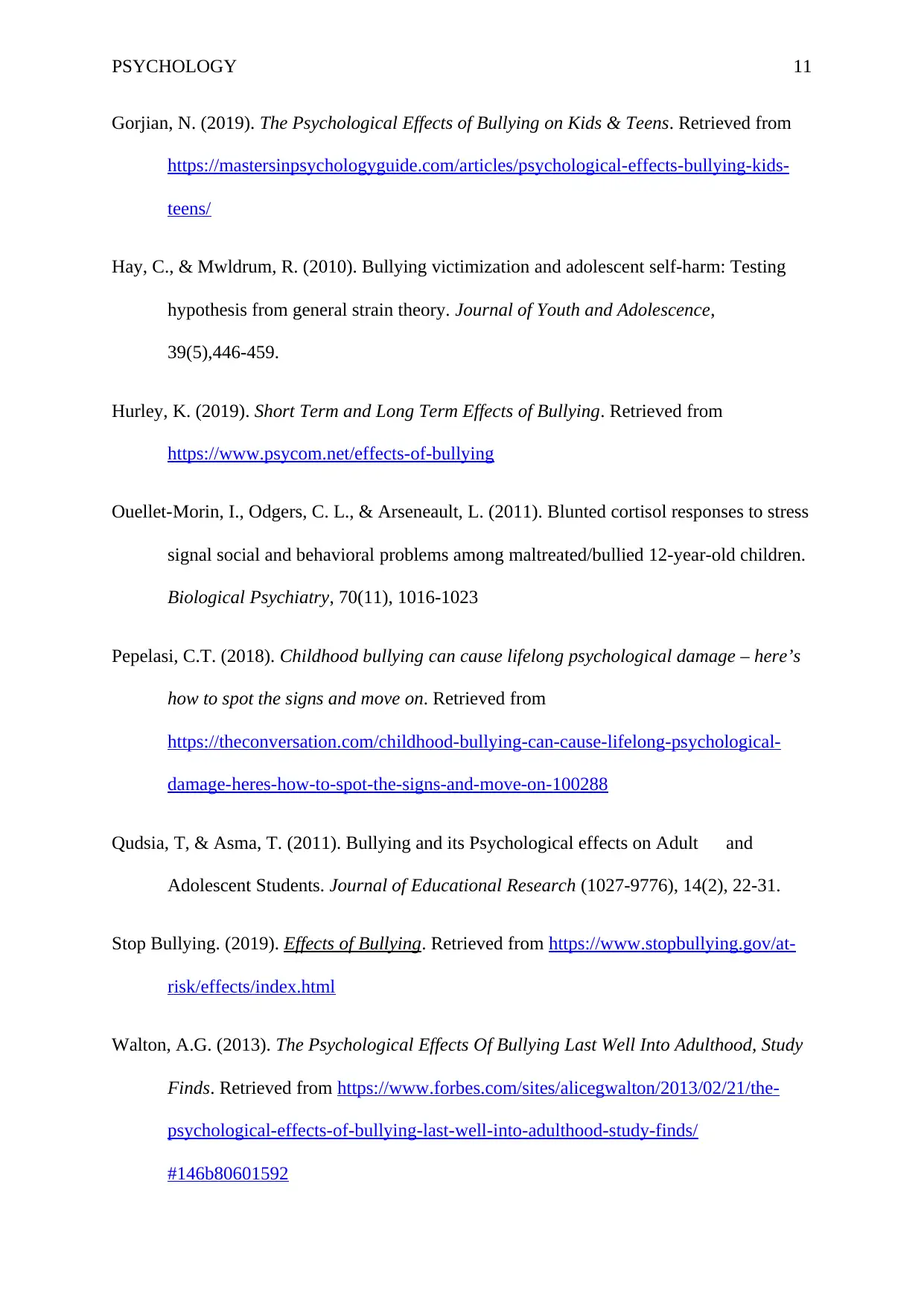
PSYCHOLOGY 11
Gorjian, N. (2019). The Psychological Effects of Bullying on Kids & Teens. Retrieved from
https://mastersinpsychologyguide.com/articles/psychological-effects-bullying-kids-
teens/
Hay, C., & Mwldrum, R. (2010). Bullying victimization and adolescent self-harm: Testing
hypothesis from general strain theory. Journal of Youth and Adolescence,
39(5),446-459.
Hurley, K. (2019). Short Term and Long Term Effects of Bullying. Retrieved from
https://www.psycom.net/effects-of-bullying
Ouellet-Morin, I., Odgers, C. L., & Arseneault, L. (2011). Blunted cortisol responses to stress
signal social and behavioral problems among maltreated/bullied 12-year-old children.
Biological Psychiatry, 70(11), 1016-1023
Pepelasi, C.T. (2018). Childhood bullying can cause lifelong psychological damage – here’s
how to spot the signs and move on. Retrieved from
https://theconversation.com/childhood-bullying-can-cause-lifelong-psychological-
damage-heres-how-to-spot-the-signs-and-move-on-100288
Qudsia, T, & Asma, T. (2011). Bullying and its Psychological effects on Adult and
Adolescent Students. Journal of Educational Research (1027-9776), 14(2), 22-31.
Stop Bullying. (2019). Effects of Bullying. Retrieved from https://www.stopbullying.gov/at-
risk/effects/index.html
Walton, A.G. (2013). The Psychological Effects Of Bullying Last Well Into Adulthood, Study
Finds. Retrieved from https://www.forbes.com/sites/alicegwalton/2013/02/21/the-
psychological-effects-of-bullying-last-well-into-adulthood-study-finds/
#146b80601592
Gorjian, N. (2019). The Psychological Effects of Bullying on Kids & Teens. Retrieved from
https://mastersinpsychologyguide.com/articles/psychological-effects-bullying-kids-
teens/
Hay, C., & Mwldrum, R. (2010). Bullying victimization and adolescent self-harm: Testing
hypothesis from general strain theory. Journal of Youth and Adolescence,
39(5),446-459.
Hurley, K. (2019). Short Term and Long Term Effects of Bullying. Retrieved from
https://www.psycom.net/effects-of-bullying
Ouellet-Morin, I., Odgers, C. L., & Arseneault, L. (2011). Blunted cortisol responses to stress
signal social and behavioral problems among maltreated/bullied 12-year-old children.
Biological Psychiatry, 70(11), 1016-1023
Pepelasi, C.T. (2018). Childhood bullying can cause lifelong psychological damage – here’s
how to spot the signs and move on. Retrieved from
https://theconversation.com/childhood-bullying-can-cause-lifelong-psychological-
damage-heres-how-to-spot-the-signs-and-move-on-100288
Qudsia, T, & Asma, T. (2011). Bullying and its Psychological effects on Adult and
Adolescent Students. Journal of Educational Research (1027-9776), 14(2), 22-31.
Stop Bullying. (2019). Effects of Bullying. Retrieved from https://www.stopbullying.gov/at-
risk/effects/index.html
Walton, A.G. (2013). The Psychological Effects Of Bullying Last Well Into Adulthood, Study
Finds. Retrieved from https://www.forbes.com/sites/alicegwalton/2013/02/21/the-
psychological-effects-of-bullying-last-well-into-adulthood-study-finds/
#146b80601592
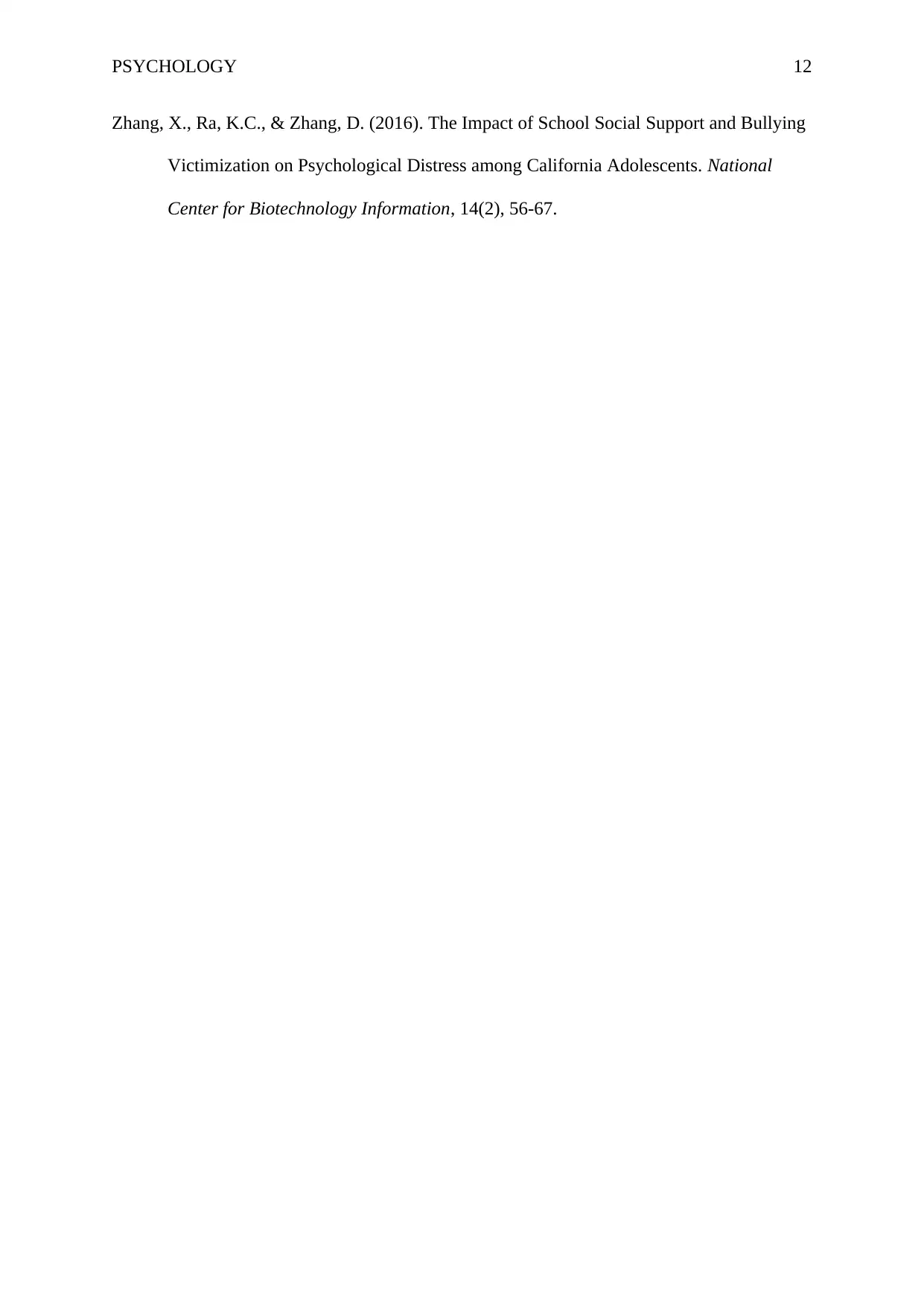
PSYCHOLOGY 12
Zhang, X., Ra, K.C., & Zhang, D. (2016). The Impact of School Social Support and Bullying
Victimization on Psychological Distress among California Adolescents. National
Center for Biotechnology Information, 14(2), 56-67.
Zhang, X., Ra, K.C., & Zhang, D. (2016). The Impact of School Social Support and Bullying
Victimization on Psychological Distress among California Adolescents. National
Center for Biotechnology Information, 14(2), 56-67.
⊘ This is a preview!⊘
Do you want full access?
Subscribe today to unlock all pages.

Trusted by 1+ million students worldwide
1 out of 12
Related Documents
Your All-in-One AI-Powered Toolkit for Academic Success.
+13062052269
info@desklib.com
Available 24*7 on WhatsApp / Email
![[object Object]](/_next/static/media/star-bottom.7253800d.svg)
Unlock your academic potential
Copyright © 2020–2026 A2Z Services. All Rights Reserved. Developed and managed by ZUCOL.





